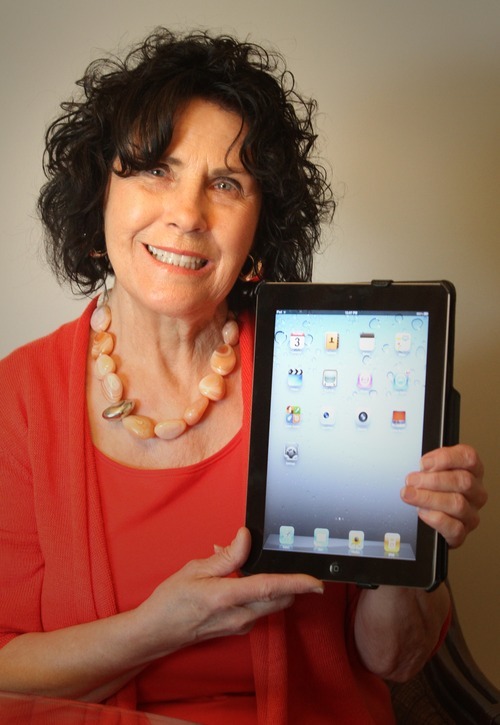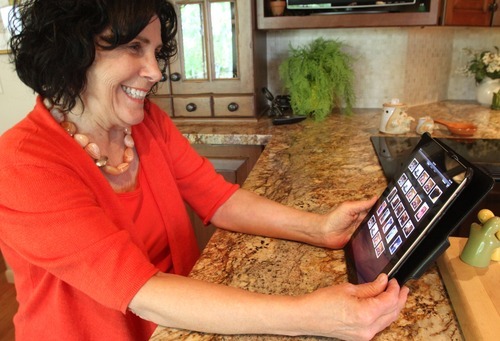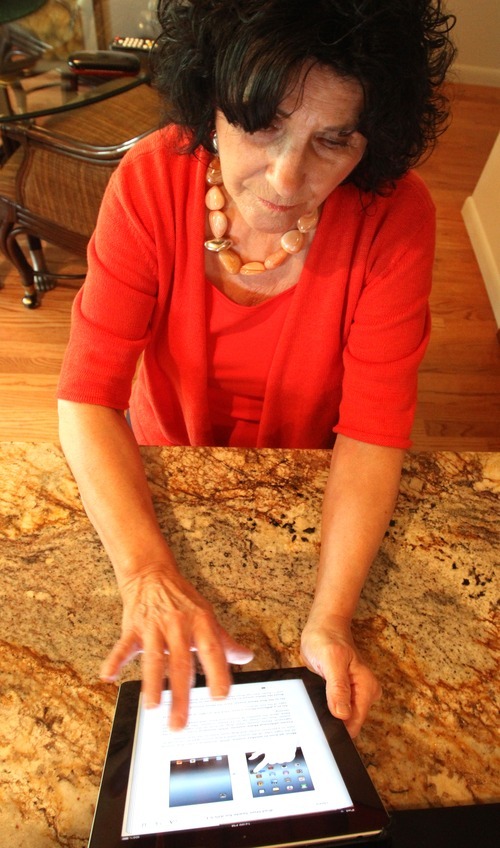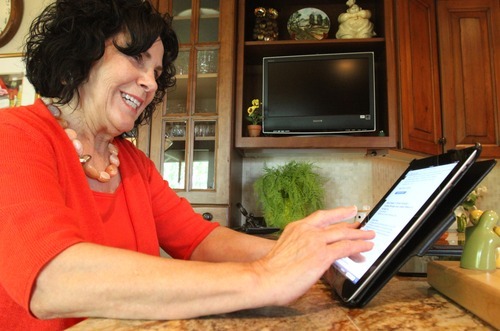This is an archived article that was published on sltrib.com in 2012, and information in the article may be outdated. It is provided only for personal research purposes and may not be reprinted.
There were about a dozen people, each one grasping an iPad, at a recent class at the new Millcreek Community Center in Salt Lake County. Looking up at the instructor, they were learning how to use the simplest functions, from downloading an app to turning on Facetime.
This was a particularly courageous bunch of newbies, a class of seniors over 60 from around the neighborhood. The group is a segment of the nation's so-called Silver Surfers, who have jumped into the technological pool feet first, struggling at times in a sea of digital-age terms such as "multitasking" and "streaming."
Yet they were eager to learn. Many of them, such as 75-year-old Eva Heiner, had just received an iPad from their kids or grandchildren and were not about to let the expensive gadgets go to waste.
"I felt excited to have it, yet I wasn't. In fact, I was considering on taking it back," Heiner, Salt Lake City, said about the iPad she received from her kids for Christmas. "I talked to my son and said I didn't want it, and he contacted where he got it. But he gave me a little lecture on it, so I kept it."
Millcreek Community Center, 2266 E. Evergreen Ave., is one of several community and senior centers in Salt Lake County offering classes for seniors on how to use their iPads, Kindles and other mobile devices for this expanding demographic of users.
Seven percent of all owners of computer tablets, including iPads, Kindles and Android tablets, are over the age of 65, and another 21 percent are over 50, according to the latest figures from Nielsen. And in a recent survey by Harris Interactive, 17 percent of people over the age of 67 said they were at least "somewhat likely" to get a computer tablet or e-reader within the next six months.
For some, it's the very first computing device they have ever laid their hands on. They either bought a tablet or received one as a gift, thinking it might be easier to operate than a home computer. Yet there are still steps to learn, from video conferencing with loved ones to just listening to music.
"I've been talking about getting into the computer and learning," Heiner said about why she was eager to dig into her new iPad. "I feel a little bit dumb about it. I feel like I'm losing track of everything that's going on."
Frank Barton, president of Right at Home, which provides in-home care and assistance for seniors, was looking for ways to volunteer at the Mount Olympus Senior Center, 1635 E. Murray-Holladay Road, when he was asked several months ago about conducting a class on iPads.
"We expected less than 10, and we had over 30 attend that first class," he said. "It was a bit of a surprise to me."
Now, he gives monthly classes on iPads and Kindles at Mount Olympus and Millcreek. The Sandy Senior Center, 9310 S. 1300 East, also offers monthly classes.
"They're maybe more just frustrated than intimidated," he said about seniors who struggle with their new devices. "They want to use it, and they realize that they are not getting as much from the device, and they want to come to the class to empower themselves."
Heiner attended the class because she wanted to learn how to navigate the tablet's screen of icons, folders and sliders.
"It isn't bothering me to use it," she said about her new gadget. "It just gets me nervous when I go certain ways or I start looking for something and I don't know how to get there."
In many cases, these mobile devices have become a way for the younger generations to try and connect with the older generation, so they give them as gifts.
"An adult child thinks this is great so [their parents] can read books. But they don't realize there are so many steps to using it," said Susie Cates, the supervisor for Mount Olympus. "There are so many options, and that's why we want to have classes — to make them feel successful about it."
Google+: +Vincent Horiuchi —
Tips for seniors using tablets
Consider using a stylus built for computer tablets that have capacitive touchscreens (such as the iPad). The screens may have a problem recognizing the touch from someone with slower circulation.
Reading apps, such as those for the Kindle or iBooks, have adjustable font sizes so you can make the words bigger if you're having trouble seeing them.
Be wary of buying your first apps. There are plenty of free versions available to try out first, especially if you are new to tablets.
Never give out your iTunes or Android Market password to grandchildren. They might then purchase and download tons of apps without considering the cost to you. —
Apps for seniors
Consider these freebies first for your new tablet.
Netflix (iPad, Android) • If you have a subscription to Netflix's Watch Instantly streaming movie service, this is a must-have to view all those movies and TV shows on your tablet.
Pandora (iPad, Android) • Sometimes, your favorite genres of music, whether Big Band tunes or classical, aren't available on the radio. But they are through this free music-streaming service.
Skype (iPad, Android) • Video conferencing with loved ones is easy with this app that can connect you with family, even if they're on the other side of the world.
Kindle (iPad, Android) • If you don't own a Kindle for reading books, don't worry. This app makes reading any Kindle-formatted volume from the Amazon's book store compatible on iPads or Android-based tablets. —
Senior center info
Mount Olympus Senior Center (1635 E. Murray-Holladay Road), http://userpages.burgoyne.com/mtolysc/
The Sandy Senior Center (9310 S. 1300 East), http://www.sandyseniorcenter.org/









